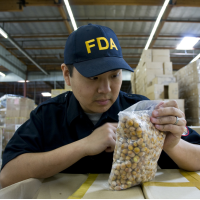As Food Imports Increase, FDA Can’t Keep Up with Inspections
 FDA inspector, food imported unchecked, food imports not checked
FDA inspector, food imported unchecked, food imports not checked
Virtually all of the food imported into the United States reaches consumers without being inspected by the federal government, putting the nation at risk of exposure to food-borne illnesses.
An investigation by FairWarning and Investigative News Network (INN) found that Food and Drug Administration (FDA) inspectors allow nearly all food imports to enter the country without undergoing visual examination.
“The FDA has been outgunned and overmatched for years as a rising tide of imported food has found a place at the U.S. dinner table,” FairWarning’s Rick Schmitt wrote. “Because of budget constraints ordinarily only 1 percent to 2 percent of food imports are physically inspected by the agency at the border each year.”
The incredibly low inspection rate is particularly alarming considering that food imports have been steady growing in the U.S.
Consider these numbers collected by FairWarning and INN:
- Fifteen percent of the American diet now originates overseas
- About 50% of all winter fruits and vegetables bought in the United States are grown in other countries
- Nearly all seafood eaten by Americans is caught in non-U.S. waters.
The FDA, however, can’t keep up with the volume of food imports, not when there are
130,000 export facilities in 150 countries to check on. The agency often inspects foreign processing plants only after there has been shown to be a problem with the product.
In India, Moon Fishery India Pvt. Ltd was found to be running a truly horrible operation, replete with “water tanks rife with microbiological contamination, rusty carving knives, peeling paint above the work area, unsanitary bathrooms and an ice machine covered with insects and ‘apparent bird feces,’” FairWarning and INN reported. The company’s exports to the U.S. were halted.
But by then tainted food had already reached the U.S., causing a salmonella outbreak that sickened 425 people, hospitalizing 55, in 28 states and the District of Columbia.
The 2011 Food Safety Modernization Act was supposed to address some of these problems, but its provisions have yet to be implemented, partly because of lack of funding.
-Noel Brinkerhoff
To Learn More:
As More Imported Foods Reach the Dinner Table, Holes Remain in FDA Safety Net (by Rick Schmitt, FairWarning)
FDA Struggles to Crack Down on Safety of Food Imports (by Matt Bewig, AllGov)
- Top Stories
- Unusual News
- Where is the Money Going?
- Controversies
- U.S. and the World
- Appointments and Resignations
- Latest News
- What If China Invaded the United States?
- Donald Trump Has a Mental Health Problem and It Has a Name
- Trump Goes on Renaming Frenzy
- Trump Deports JD Vance and His Wife
- Trump Offers to Return Alaska to Russia






Comments